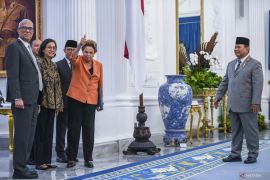"Especially in the third quarter when such momentum as religious holidays or other large events is relatively rare this will certainly have implications on economic performance," he said in a virtual press conference here on Sunday.
In the second quarter of 2022, Indonesia's economic growth was 5.44 percent. Indef lauded this achievement since the government itself had projected the second-quarter growth to be slightly lower than the realization.
Listiyanto said that if economic growth in the third and fourth quarters of 2022 could be maintained at 5.44 percent, then it would be very good.
However, he predicted the economic growth in the third and fourth quarters will likely be lower than in the second quarter because there is no holiday momentum such as Eid, The only momentum will be Christmas in the fourth quarter of 2022.
"Moreover, the trend of inflation is also getting higher from month to month and it will also be a challenge since the inflation erodes purchasing power and makes consumption even more sluggish,” said Listiyanto.
Related news: Minister optimistic of economic growth of 5.2 percent throughout 2022
Entering the third quarter of 2022, he hoped that the four main sectors that contribute the most to Gross Domestic Product (GDP), such as industry, mining, agriculture and trade, can be boosted again.
This is because the contributions of the four sectors to GDP were still low as they only grew by an average of 4 percent (compared to the previous year) or below the (year-on-year) economic growth of 5.44 percent in the second quarter of 2022.
"The previous growth was actually driven by supporting sectors. Meanwhile, the main sector has not recovered much. If we don't push the dominant sector, the economy will be vulnerable," said the Deputy Director of Indef.
Global uncertainty, especially due to geopolitical crises such as the war between Russia and Ukraine, will add to the economic challenges in the third and fourth quarters of 2022.
"Moreover, there was a provocation from the United States (US), with the Speaker of the US House of Representatives (Nancy Pelosi) coming to Taiwan. This creates even higher uncertainty. The geopolitical crisis that previously only occurred in Europe is now shifting to Asia," he said.
From the financial side, Listiyanto said that the aggressiveness of the Fed's interest rate hike will continue until there are signs of easing inflationary pressures in the US. The US targets that this aggressiveness will be stopped if US inflation reaches 2 percent. However, US inflation is currently more than 9 percent.
Therefore, Listiyanto estimates that next year there will still be an increase in the Fed Funds Rate (FFR), which may have implications for volatility in the financial sector.
Related news: Subsidies, interest rate restraint effective in boosting Q2 growth
Related news: Indonesian economy still concentrated on Java Island: BPS Head
Translator: Katriana
Editor: Suharto
Copyright © ANTARA 2022











